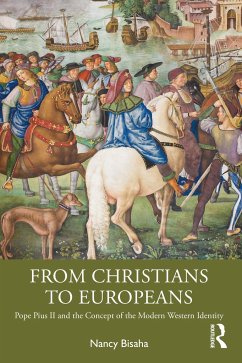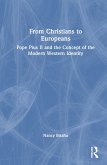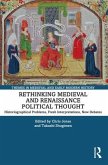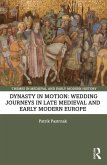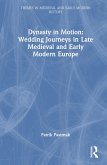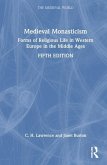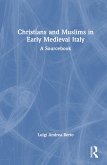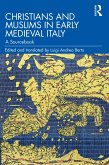Providing the first in-depth examination of Pope Pius II's development of the concept of Europe and what it meant to be 'European', From Christians to Europeans charts his life and work from his early years as a secretary in Northern Europe to his papacy.
This volume introduces students and scholars to the concept of Europe by an important and influential early thinker. It also provides Renaissance specialists who already know him with the fullest consideration to date of how and why Pius (1405-1464) constructed the idea of a unified European culture, society, and identity. Author Nancy Bisaha shows how Pius's years of travel, his emotional response to the fall of Constantinople in 1453, and the impact of classical ethnography and other works shaped this compelling vision-with close readings of his letters, orations, histories, autobiography, and other works. Europeans, as Pius boldly defined them, shared a distinct character that made them superior to the inhabitantsof other continents. The reverberations of his views can still be felt today in debates about identity, ethnicity, race, and belonging in Europe and more generally. This study explores the formation of this problematic notion of privilege and separation-centuries before the modern era, where most scholars have erroneously placed its origins. From Christians to Europeans adds substantially to our understanding of the Renaissance as a critical time of European self-fashioning and the creation of a modern "Western" identity.
This book is essential reading for students and scholars interested in the formation of modern Europe, intellectual history, cultural studies, and the history of Renaissance Europe, late medieval Italy, and the Ottoman Empire.
This volume introduces students and scholars to the concept of Europe by an important and influential early thinker. It also provides Renaissance specialists who already know him with the fullest consideration to date of how and why Pius (1405-1464) constructed the idea of a unified European culture, society, and identity. Author Nancy Bisaha shows how Pius's years of travel, his emotional response to the fall of Constantinople in 1453, and the impact of classical ethnography and other works shaped this compelling vision-with close readings of his letters, orations, histories, autobiography, and other works. Europeans, as Pius boldly defined them, shared a distinct character that made them superior to the inhabitantsof other continents. The reverberations of his views can still be felt today in debates about identity, ethnicity, race, and belonging in Europe and more generally. This study explores the formation of this problematic notion of privilege and separation-centuries before the modern era, where most scholars have erroneously placed its origins. From Christians to Europeans adds substantially to our understanding of the Renaissance as a critical time of European self-fashioning and the creation of a modern "Western" identity.
This book is essential reading for students and scholars interested in the formation of modern Europe, intellectual history, cultural studies, and the history of Renaissance Europe, late medieval Italy, and the Ottoman Empire.
"Pius II was an accomplished humanist and a key shaper of the 15th-century Church's response to the Ottoman conquests. He was also, as Nancy Bisaha's learned and compelling biography, From Christendom to Europe, argues, one of the architects of European identity."
John Tolan, Professor of History, University of Nantes
"Pius II was the most important of the Renaissance popes, enriching the work of the Church with humanist techniques and values. Pius's concept of Europe was a key element in his world view and Nancy Bisaha, a leading scholar of humanism, offers the first book-length treatment of the subject in From Christendom to Europe."
Norman Housley, Professor Emeritus, University of Leicester
"From Christendom to Europe expertly reconstructs a forgotten and crucial chapter in the conceptualization of Europe and the development of European identity. At the same time, Bisaha's sharp analysis sheds important new light on Pope Pius II - a towering figure in the intellectual, political, and religious worlds of Renaissance Italy."
Emily O'Brien, Associate Professor, Departments of History and Humanities, Simon Fraser University
John Tolan, Professor of History, University of Nantes
"Pius II was the most important of the Renaissance popes, enriching the work of the Church with humanist techniques and values. Pius's concept of Europe was a key element in his world view and Nancy Bisaha, a leading scholar of humanism, offers the first book-length treatment of the subject in From Christendom to Europe."
Norman Housley, Professor Emeritus, University of Leicester
"From Christendom to Europe expertly reconstructs a forgotten and crucial chapter in the conceptualization of Europe and the development of European identity. At the same time, Bisaha's sharp analysis sheds important new light on Pope Pius II - a towering figure in the intellectual, political, and religious worlds of Renaissance Italy."
Emily O'Brien, Associate Professor, Departments of History and Humanities, Simon Fraser University

